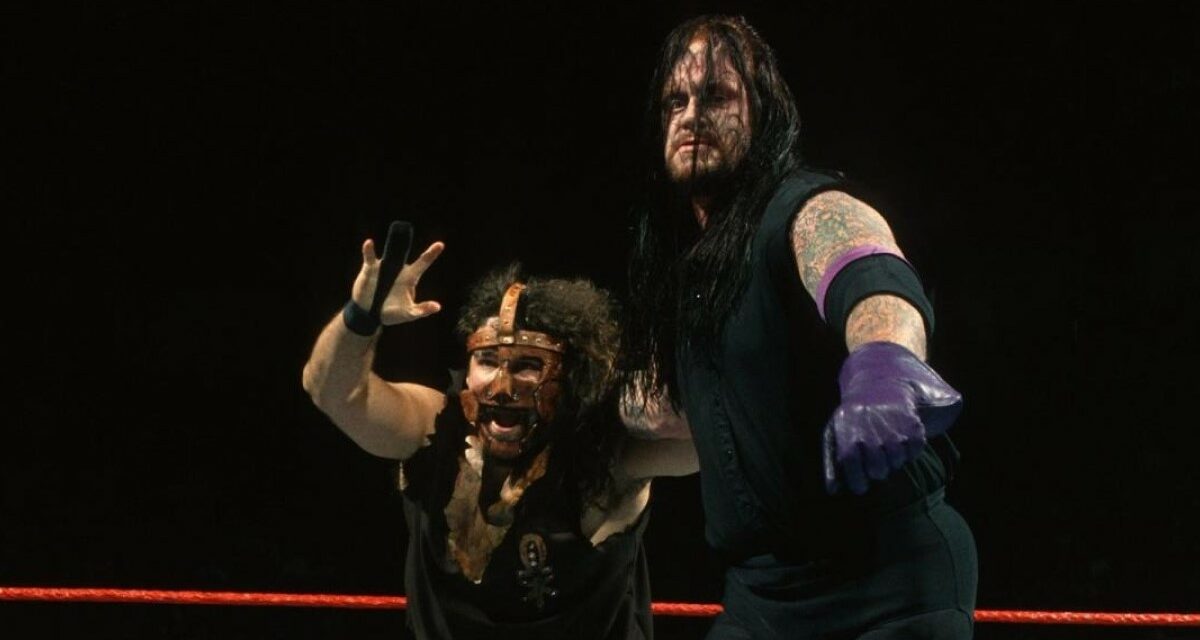In contrast to last week’s very good exploration of the feud between Hulk Hogan and André the Giant, this week’s episode of WWE/A&E’s Rivals returns to a humdrum retelling of the greatest hits of the work between The Undertaker and Mick Foley. There are a couple of gems hidden in this hour of TV, but somewhere just after the halfway mark it focuses exclusively on their Hell in a Cell match from 1998, which is one of the most well-documented matches already.
The roundtable guest list for this episode is the same as last week’s: Freddie Prinze, Jr., Booker T, Natalya, D-Von Dudley, and John Bradshaw Layfield. JBL ends up being the one with the most interesting insight, as he had a front-row seat for this feud as a working wrestler in the then-WWF at the time. Natalya specifically seems like an afterthought in this episode, unfortunately, and many of Prinze’s questions are just left hanging as the episode cuts to another recorded interview, never hearing the table’s thoughts.
Setting up the feud, JBL describes Undertaker as the most well-respected person he’s ever known in any sport or business. Taker himself describes how he had been beating up giants in the ring for such a long time in the WWF that he was expected to run through everybody. Enter Foley, who Jim Ross describes as someone he kept pitching and pitching to Vince to bring to the WWF as a different kind of monster for Undertaker to battle.
Foley recalls riding and sharing rooms with Mark Calaway before he became the Undertaker when they were both in WCW, but knew when he saw Taker debut at Survivor Series that Calaway had become something else entirely.
The best parts of the show are some extended clips of Mankind’s first promos, alongside George the Rat, and both Foley and Undertaker’s preparation and the aftermath of their Boiler Room Brawl match. It’s fun to hear them chatting casually after the first part of the match that had been pre-recorded the night before the match’s conclusion at SummerSlam in 1996. During the filming of the fight, Undertaker opened a cut on his elbow, and had to keep it from closing up over the next 24 hours so he could sport it going into the ring for the end of the match.
There’s a segment on their Buried Alive match from later that year at an In Your House show, the highlight of which is Bruce Prichard explaining that there had been a gross miscalculation of how long it would take for Foley and Terry Gordy as The Executioner to fill the grave up with dirt, so out came a bunch of uninvolved wrestlers to help. I suppose they either didn’t want to give away their magician’s secret of how Undertaker found safety under all of that dirt, or the Phenom is simply that magical.
The show skips forward to Hell in a Cell, and once more there’s nothing new here. In fact, a good portion of the episode lets the opening part of the match play on in close to real time. It is still fascinating to watch, of course, but it feels like stretching the time to fill the episode all the same.
Foley closes the show by explaining the aftermath of that match stayed with him for years, and that he would get cantankerous being asked about it so often. Finally, though, both he and Undertaker came to fully appreciate just what they created that night and how much it means to people.
There’s a clip of Foley’s WWE Hall of Fame speech in 2013 with him thanking The Undertaker. Hmm, they don’t show The Undertaker thanking Foley at his own Hall of Fame induction — right, because it didn’t happen. Ah well, despite oversights like that the two wrestlers make it clear in this episode how much of their own legacy they owe to each other.
Related Links:
Mick Foley / Mankind / Cactus Jack / Dude Love story archive

